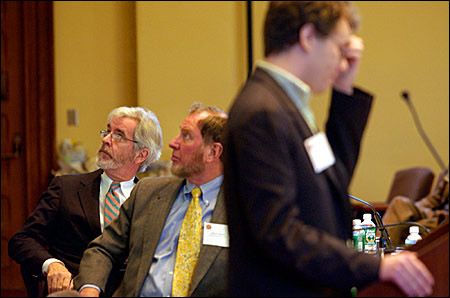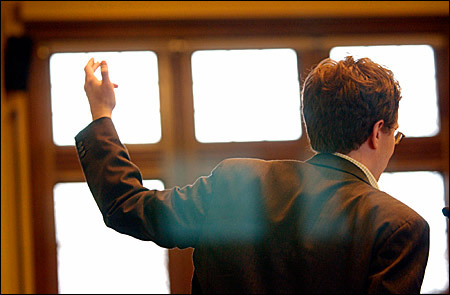How did Internet affect election?
Berkman Center conference examines the Web and presidential politics

From Howard Dean’s fundraising to the technology of voting, the Internet and online technology took a starring role in the 2004 election. But once the votes were tallied, did the Internet matter? Last week (Dec. 9 – 11), the “Votes, Bits & Bytes” conference at Harvard Law School’s (HLS) Berkman Center for Internet and Society explored the role of the Internet in the United States and international elections as well as in the broader contexts of politics and citizenship. Scholars, bloggers, journalists, entrepreneurs, and political organizers – including the e-campaign managers for both George W. Bush and John Kerry – gathered for spirited discussions of online implications for democracy and citizenship.
From gathering news to creating community to amassing voters and volunteers, several speakers agreed that the Internet has provided a new tool to access very old-fashioned ideas. With its power to reach individuals directly and to let ordinary citizens connect with each other, whether via self-published Web logs or hyperfocused interest groups, the Internet in many ways returned politics to the grassroots.
“It’s the democratization of democracy,” said keynote speaker Scott Heiferman, co-founder and CEO of meetup.com.

Grassroots vs. ‘command and control’
In a candid and sometimes heated panel Friday afternoon that focused on the use of the Internet in the 2004 U.S. presidential election, the head of the Kerry-Edwards 2004 online communication admitted that his campaign’s online efforts fell short, in part because they failed to embrace some traditional democratic values.
“The right is beating the left at what used to be our game: grassroots politics, real democracy,” said Zack Exley, director of online communication and organization for Kerry-Edwards 2004. “Ironically, we were a little more ‘command and control,’ which doesn’t really reflect the way the Democratic Party works.”
Exley admitted that while Kerry won the primaries largely on the strength of a very well organized grassroots campaign in Iowa, the campaign’s online strategy lacked the planning and vision to harness the energy of volunteers it recruited.
The goals of the president’s online campaign were similar to his Democratic challenger’s: recruit volunteers, raise money, and disseminate his message. Chuck DeFeo, eCampaign manager for Bush-Cheney ’04, described how the Republicans used the Internet as a tool to build grassroots support by strengthening community bonds. The campaign created geographic as well as online communities of supporters, encouraging neighborhood door knocking and local “Parties for the President.”
See the conference schedule and Webcasts of several sessions
“We didn’t invent door-knocking campaigns or neighbor-to-neighbor talking, but the Internet’s returned it to politics,” he said. Nonetheless, DeFeo admitted, “the Internet story is a small part of this great grassroots movement that came out for the president.”
Sunshine Hillygus, assistant professor of government at Harvard, added that while grassroots mobilization deserved mention, the critical story of the election was Iraq.
Hillygus, appointed “academic curmudgeon” by moderator and HLS Professor Heather Gerkin, noted several disturbing effects of the Internet on the democratic process. It’s making it easier to avoid politics for those disinterested, she said; its proliferation of one-sided information is polarizing politics, and it has pressured traditional news media to produce faster, more scandal-driven, less researched news.
While San Jose Mercury News journalist Dan Gilmore echoed Hillygus’ concerns about the Internet’s negative pressures on traditional news media, he conceded that “the mainstream media … did an abysmal job covering this campaign.” Yet nontraditional media like Web logs breathed new life into coverage, moving reporting from the lecture-like format of traditional media to more of a conversation, he said.
Gilmore, like several other panelists, also remarked upon the Internet’s effectiveness at shifting the funding structure of campaigns away from large donations and toward many small donations solicited online. “Any system that helps generate lots of small donations from lots and lots of people is going to be better than what we have … because it means that people are getting involved,” he said.
No more bowling alone?
While keynote remarks by meetup.com’s Heiferman and Robert Putnam, the Malkin Professor of Public Policy at the Kennedy School of Government, were not expressly about politics, they did point repeatedly to the Internet’s ability to return power to small grassroots groups.
Inspired by Putnam’s 2001 best-selling book “Bowling Alone: The Collapse and Revival of American Community,” meetup.com goes far beyond “that Howard Dean thing” for which it’s known to many, said Heiferman. The site, which connects individuals with interest groups in their geographic areas for online conversation and monthly face-to-face “meetups,” is bestowing the power of organization on groups that initially form around social contacts. As pug owners, knitters, ukulele players, Hungarian speakers, or stay-at-home-moms (the largest category of meetups) gather regularly in their communities, Heiferman says, they aggregate their efforts to save the Hungarian language, create ukulele solidarity, or leave no pug behind.
Despite its reputation as an organizing tool for leftist political groups, Heiferman noted that politics comprise only 13 percent of the site’s activity. Still, he said, 50 percent of the people who attended political meetups had never attended a political meeting before.
Putnam lauded meetup.com for ending what he called the pointless debate about whether virtual communities are “real” communities. “They are blended communities,” he said, “communities that are alloys of silicon and flesh.”




